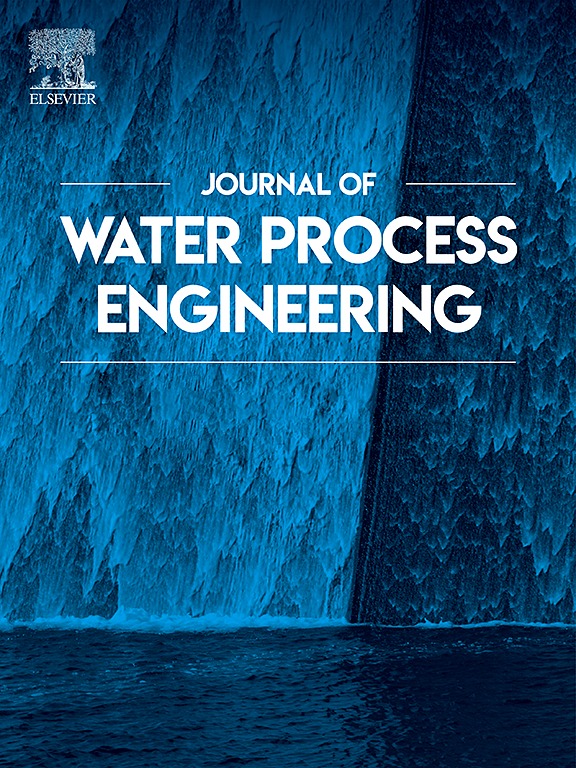塑料添加剂对生物降解塑料和污泥厌氧生物再利用的影响:关注消化过程、微生物组成和代谢特征
IF 6.7
2区 工程技术
Q1 ENGINEERING, CHEMICAL
引用次数: 0
摘要
可降解塑料(BPs)中不可避免地会释放出塑料添加剂(PAs),这可能会影响随后的生物再利用,而 PAs 对厌氧协同消化性能的影响仍存在争议。本研究评估了三种典型的 PA(邻苯二甲酸二(2-乙基己基)酯(DEHP)、柠檬酸三丁酯(ATBC)和柠檬酸三丁酯(TBC))对可降解塑料与垃圾活性污泥(WAS)厌氧共消化的影响。结果表明,生物碱类型对甲烷产量有显著影响,但在一定浓度范围内(0.5-50 毫克/克 TSS),PA 的影响可以忽略不计。机理研究发现,添加 PAs 对溶解、水解和酸化阶段的影响不大。微生物群落分析表明,PAs 没有改变微生物群落的多样性和组成。此外,添加 PAs 对微生物的代谢功能没有直接影响。这项研究揭示了 PAs 对 BPs 生物再利用的影响,有助于更好地了解塑料对环境的潜在危害。本文章由计算机程序翻译,如有差异,请以英文原文为准。

Effect of plastic additives on anaerobic biological reutilization of biodegradable plastics and sludge: Focusing on the digestion process, microbial composition and metabolic traits
The inevitable release of plastic additives (PAs) from biodegradable plastics (BPs) might affect the ensuing biological reutilization, and the impact of PAs on anaerobic co-digestion performance is still controversial. This study evaluated the impacts of three typical PAs (bis(2-ethylhexyl) phthalate (DEHP), acetyl tributylcitrate (ATBC), tributyl citrate (TBC)) on the BPs anaerobic co-digestion with waste-activated sludge (WAS). Results indicated that the BPs type had a significant effect on methane production, but the effect of PAs was negligible within a concentration range (0.5–50 mg/g TSS). Mechanistic exploration revealed that PAs addition exhibited insignificant effects on solubilization, hydrolysis, and acidification stage. Microbial communities' analyses suggested that PAs did not change the diversity and composition of microbial communities. Furthermore, the addition of PAs has no direct effect on the metabolic function of microorganisms. This study shed light on the effects of PAs on BPs biological reutilization and help to gain a better understanding of the potential environmental hazards of plastics.
求助全文
通过发布文献求助,成功后即可免费获取论文全文。
去求助
来源期刊

Journal of water process engineering
Biochemistry, Genetics and Molecular Biology-Biotechnology
CiteScore
10.70
自引率
8.60%
发文量
846
审稿时长
24 days
期刊介绍:
The Journal of Water Process Engineering aims to publish refereed, high-quality research papers with significant novelty and impact in all areas of the engineering of water and wastewater processing . Papers on advanced and novel treatment processes and technologies are particularly welcome. The Journal considers papers in areas such as nanotechnology and biotechnology applications in water, novel oxidation and separation processes, membrane processes (except those for desalination) , catalytic processes for the removal of water contaminants, sustainable processes, water reuse and recycling, water use and wastewater minimization, integrated/hybrid technology, process modeling of water treatment and novel treatment processes. Submissions on the subject of adsorbents, including standard measurements of adsorption kinetics and equilibrium will only be considered if there is a genuine case for novelty and contribution, for example highly novel, sustainable adsorbents and their use: papers on activated carbon-type materials derived from natural matter, or surfactant-modified clays and related minerals, would not fulfil this criterion. The Journal particularly welcomes contributions involving environmentally, economically and socially sustainable technology for water treatment, including those which are energy-efficient, with minimal or no chemical consumption, and capable of water recycling and reuse that minimizes the direct disposal of wastewater to the aquatic environment. Papers that describe novel ideas for solving issues related to water quality and availability are also welcome, as are those that show the transfer of techniques from other disciplines. The Journal will consider papers dealing with processes for various water matrices including drinking water (except desalination), domestic, urban and industrial wastewaters, in addition to their residues. It is expected that the journal will be of particular relevance to chemical and process engineers working in the field. The Journal welcomes Full Text papers, Short Communications, State-of-the-Art Reviews and Letters to Editors and Case Studies
 求助内容:
求助内容: 应助结果提醒方式:
应助结果提醒方式:


